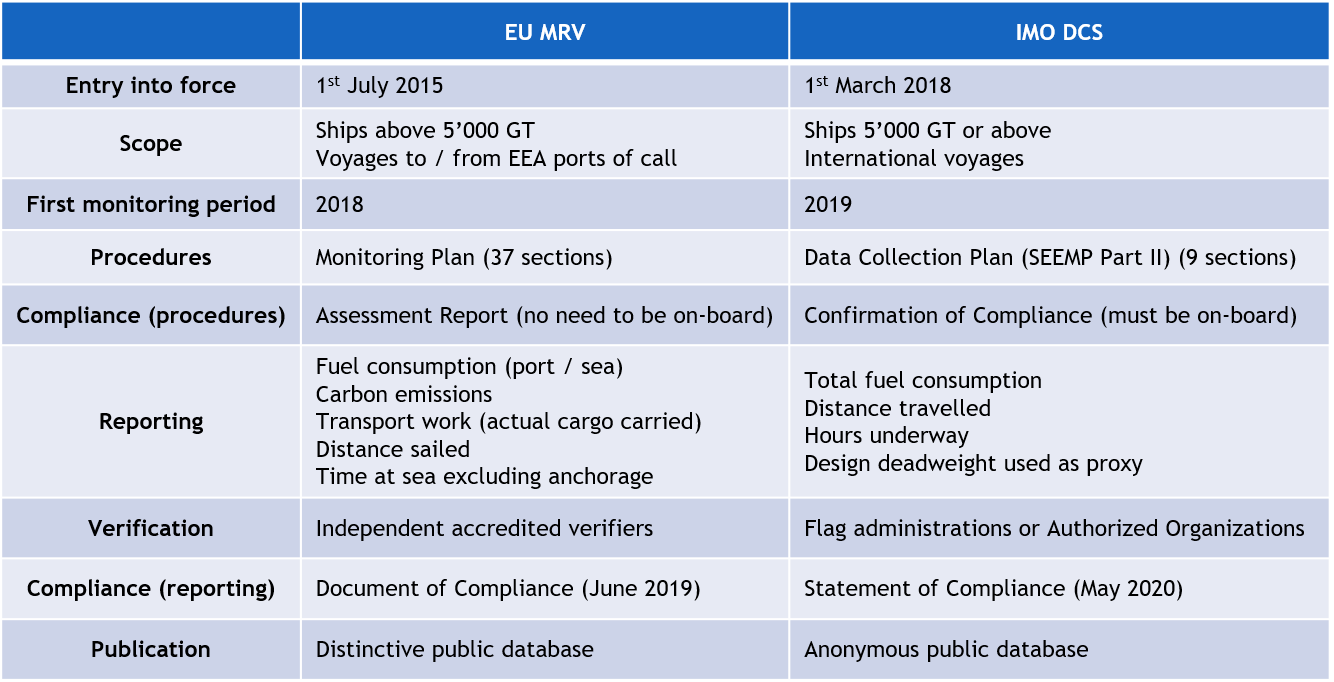The IMO Data Collection System (DCS)

The International Maritime Organization (IMO) adopted a mandatory Fuel Oil Data Collection System (DCS) for international shipping, requiring ships of 5,000 gross tonnage or above to start collecting and reporting data to an IMO database from 2019.
It was adopted by the IMO’s Marine Environment Protection Committee (MEPC70) on 28th October 2016 as amendments to Chapter 4 of Annex VI of MARPOL, adding a new Regulation 22A on Collection and reporting of ship fuel oil consumption data and new appendices covering Information to be submitted to the IMO Ship Fuel Oil Consumption Database. These amendments came into force on 1 March 2018.
What it means?
- Ships of 5’000 GT and above have to submit annual reports on fuel consumption, distance travelled and hours underway to their Administration, according to the Methodology set out in the Part II of the Ship Energy Efficiency Monitoring Plan (SEEMP).
- The 2012 Guidelines for the Development of a SEEMP have been revised accordingly and new 2016 Guidelines were adopted at MEPC (Resolution MEPC.282(70)).
- Aggregated data will be reported to a ship’s flag State after the end of each calendar year, which will need to verify that the data has been reported in accordance with the requirements before issuing a Statement of Compliance to the ship.
- Administrations will submit aggregated data to IMO for anonymized publication.
What is the Data Collection Plan (DCP)?
The DCP is a plan that describes the ship's particulars as well the procedures, systems and responsibilities used to monitor fuel consumption, hours underway and distance travelled. The DCP must be created within the Part II of the Ship Energy Efficiency Management Plan (SEEMP) and be available on-board the vessel.
The DCP is very similar to the EU MRV Monitoring Plan but consists in only 9 sections:
- Ship particulars
- Record of revision of Fuel Oil Consumption Data Collection Plan
- Ship engines and other fuel oil consumers and fuel oil types used
- Emission factor
- Method to measure fuel oil consumption
- Method to measure distance travelled
- Method to measure hours underway
- Processes that will be used to report the data to the Administration
- Data quality
The template of the DCP can be found in the Guidelines for the development of a SEEMP (MEPC.282(70)) which can be download here (see Appendix 2).
What is the fuel oil data report?
After the end of the monitoring period (2018), every ship of 5000 GT or above shall prepare a fuel oil data report using a standardized data reporting format provided by IMO.
The fuel oil data report requires the following elements:
- Method used to measure fuel oil consumption
- Fuel consumption for each type of fuel
- Hours underway and distance travelled
- Power output (auxiliary engine(s) and main propulsion power
- Other information such as ice class (if applicable), EEDI, DWT, NT, GT, ship type, IMO number, start and end dates
The standardized data reporting format can be found in the Guidelines for the development of a SEEMP (MEPC.282(70)) which can be download here (see Appendix 3).
The template of the Statement of Compliance for the fuel oil data report can be found in the IMO Resolution MEPC270(70) which can be downloaded here (see Appendix X).
What are the main differences between the IMO DCS and the EU MRV?
What is the IMO DCS timeline for shipping companies?

Learn more
> Read our FAQ
> IMO web page on DCS
> Verifavia's IMO DCS verification services
> About Verifavia's authorization from the Liberia Maritime Authority
> About Verifavia's authorizaion from the Panama Maritime Authority
> Verifavia's IMO DCS coming into force article
Download center
Download RESOLUTION MEPC.278(70)
Download Guidelines for the development of a SEEMP
Download Guidelines DCS Administration verification
Download Guidelines IMO DCS database
Download Format of Confirmation of Compliance
Download SEEMP Part II (Data Collection Plan) Template (word)
Download Data Collection and BDN Summaries Templates (Excel)
Download Guidelines for the development of a SEEMP
Download Guidelines DCS Administration verification
Download Guidelines IMO DCS database
Download Format of Confirmation of Compliance
Download SEEMP Part II (Data Collection Plan) Template (word)
Download Data Collection and BDN Summaries Templates (Excel)






